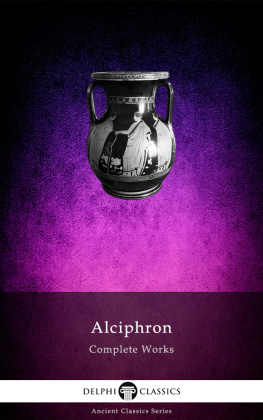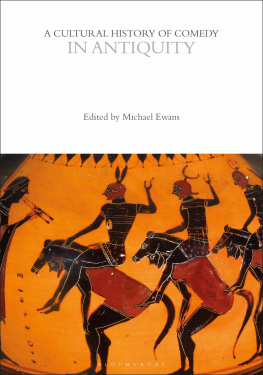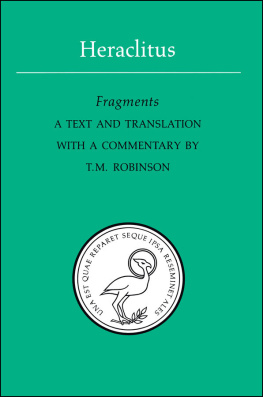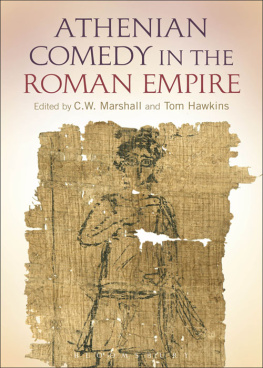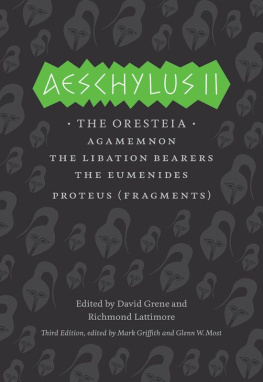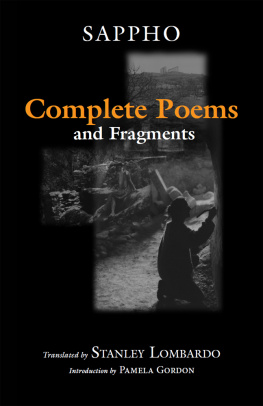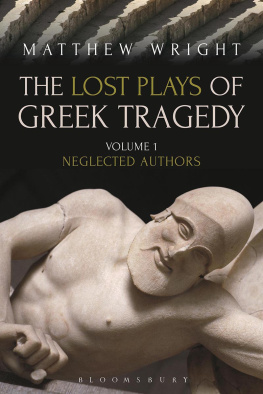
MENANDER: PLAYS AND FRAGMENTS
ADVISORY EDITOR: BETTY RADICE
Menander (341290 B.C.) was the most distinguished author of Greek New Comedy. An Athenian of good family, he wrote over a hundred plays, although only one survives intact today: Dyskolos or Old Cantankerous. This won the prize in 316 B.C. and was recovered from an Egyptian papyrus as recently as 1958. Many more fragments of his plays have since been discovered, and some sizeable pieces from The Rape of the Locks, The Arbitration and The Girl From Samos have been known since 1907. These confirm Menanders skill in drawing humorous or romantic characters and making good dramatic use of a limited range of plots with stock scenes of disguise and recognition. Menanders plays were revived in Athens after his death and some of them were adapted for the Roman stage by Plautus and Terence, through whom they strongly influenced light drama from the Renaissance onwards.
Norma Miller was educated at the universities of Glasgow and Cambridge and spent her professional life as a teacher of Greek and Latin languages and literature at the Royal Holloway College. She is now Reader Emeritus at the University of London having retired a little early in order to concentrate on writing. Most of her published works are on Tacitus, but she has taught Greek Drama for many years, and has reviewed books on Greek Drama for the Literary Review and the Journal of Hellenic Studies. In 1985 she lectured in Greek Drama at the University of Trent in Ontario, and also at the University of Toronto.
MENANDER
PLAYS AND FRAGMENTS

Translated with an Introduction by
Norma Miller
PENGUIN BOOKS
For
the Departments of
Classics
and
Drama and Theatre Studies
at
Royal Holloway and Bedford New College,
University of London
PENGUIN BOOKS
Published by the Penguin Group
Penguin Books Ltd, 80 Strand, London WC2R 0RL, England
Penguin Putnam Inc., 375 Hudson Street, New York, New York 10014, USA
Penguin Books Australia Ltd, 250 Camberwell Road, Camberwell, Victoria 3124, Australia
Penguin Books Canada Ltd, 10 Alcorn Avenue, Toronto, Ontario, Canada M4V 3B2
Penguin Books India (P) Ltd, 11 Community Centre, Panchsheel Park, New Delhi 110 017, India
Penguin Books (NZ) Ltd, Cnr Rosedale and Airborne Roads, Albany, Auckland, New Zealand
Penguin Books (South Africa) (Pty) Ltd, 24 Sturdee Avenue, Rosebank 2196, South Africa
Penguin Books Ltd, Registered Offices: 80 Strand, London WC2R 0RL, England
www.penguin.com
This translation first published 1987
19
Copyright Norma Miller, 1987
All rights reserved
Except in the United States of America, this book is sold subject
to the condition that it shall not, by way of trade or otherwise, be lent,
re-sold, hired out, or otherwise circulated without the publishers
prior consent in any form of binding or cover other than that in
which it is published and without a similar condition including this
condition being imposed on the subsequent purchaser
CONTENTS
PREFACE
It is difficult to decide, Paul Jennings once wrote, whether translators are heroes or fools. Most of those who attempt to translate a literary text will probably agree that they more often feel they belong in the second category. I should like to explain some aspects of my own foolhardiness.
This is a prose translation of a verse text, because I felt that the problems of trying to turn Menanders elegant and economical Greek into the all but uninflected English tongue were merely compounded by trying simultaneously to fit the translation into a metrical frame. References to gods, and oaths, have all been modernized, except where the reference to a particular deity is necessary for the sense; the audience is addressed as ladies and gentlemen, although the Greek says simply gentlemen; and references to specific sums of money have been avoided where possible, but where the reference is inevitable, the sums are translated as, say, 5 or 500 drachs, whichever sounds more natural in the context. These and similar devices are simply attempts to avoid jarring the modern ear where Menander did not intend it to be jarred. I have transliterated most Greek names (for example, Knemon, Nikeratos), but have preserved the traditional ch in names like Moschion, because it looks more natural in English.
I have based the translation on the Oxford Classical Text of Menander (edited by F. H. Sandbach, Oxford, 1972), and I owe a particular debt of gratitude to the commentary on it by A. W. Gomme and F. H. Sandbach (Oxford, 1973), and to the works on Menander by Professors W. G. Arnott and E. W. Handley, some of which appear in the suggestions for further reading (of what Menander wrote, and understand some of the difficulties of interpreting a fragmentary text. The Introduction is intended to be precisely that, and I hope that interested readers will go on to some of the works listed under Further Reading and to the bibliographies which they contain.
Finally, I wish to record my thanks to the late Betty Radice, who as Editor of Penguin Classics encouraged me to embark on this voyage round Menander; to Trent University in Ontario, where my Ashley Fellowship in 1985 provided me with an agreeable context in which to complete the translation; to the drama students of what was then the Royal Holloway College, for trying out some of the translation in their workshops; and to four friends who have read different parts of the typescript and offered valuable comments upon it to Robert Gordon, Eric Handley, Leslie Styler and David West. I have incorporated many of their suggestions, and where I have intransigently preferred my own views, I may yet prove to have been indeed foolish.
N.P.M.
July, 1986
INTRODUCTION
1. New Comedy For Old
To the student of European Comedy, the hundred years between 421 B.C., when Aristophanes produced Peace, and 321 B.C., when Menander probably produced Anger, present one of the most remarkable developments in the history of that dramatic form. Comedy, developing from origins that are both complex and largely conjectural, had its first official production in Athens in or about the year 486 B.C. Sixty years later, Aristophanes was producing plays which stand at the peak of that particular development of the comic form. They are extravaganzas, in which wild fantasy (to make a private peace with Sparta, to fetch a poet back from the world of the dead), politics (issues of peace or war, the jury system of the Athenian lawcourts) and personalities (Socrates, Cleon, Euripides) are presented with (occasional) bawdiness of speech and indecency of dress and gesture, the whole blended with song, dance and a poetic text which shows a bewildering mixture of accomplished metres and a wide range of imaginative vocabulary; the structure is loose, and the setting can be in Athens, Heaven, Hell or any station between.
A century later, the plays of Menander present a very different picture. Comedy is now about a very limited range of domestic or personal issues. It is about relations between fathers and sons or husbands and wives, about love affairs or about children lost and found in various permutations and combinations the elements appear and reappear, and it is remarkable how varied the plots contrive to be. In such dramas, neither fantasy nor politics has any real place; characters are no longer caricatures of real people, no longer called by comic-characteristic names like Justice-for-the-Community or Son of a Twister: instead, they have names like Chremes and Demeas, which are the fourth-century B.C. Greek equivalents of John Smith or Mr Hardcastle. The singing and dancing is reduced to a performance which acts as a kind of living curtain that separates the five acts of a tight plot structure in which it plays no part. The language of the text, while still metrical in form and elegant in style, is now much closer to reflecting the spoken language of the day both in structure and vocabulary, it is much simpler than the language of Aristophanes. Bawdiness of language and crudity of gesture have all but vanished from the text, and contemporary illustrations in the form of terracottas, sculptures or mosaics, show that the actors, though still masked, now wear ordinary Athenian dress. Both visually and conceptually, we are in a different world. What has happened to Comedy? And why?
Next page

